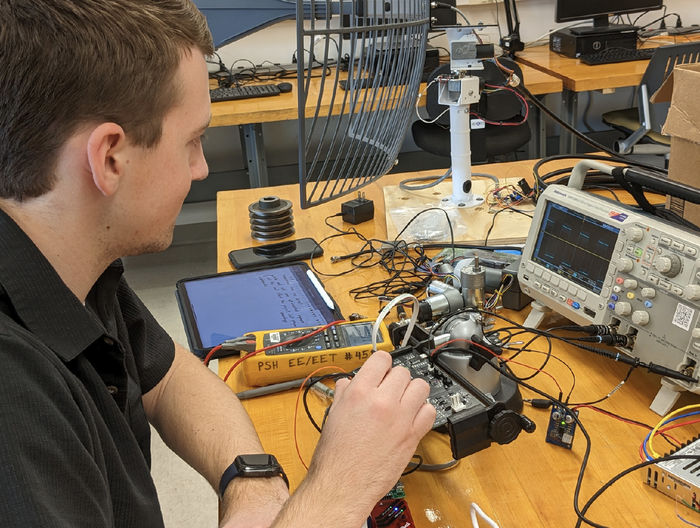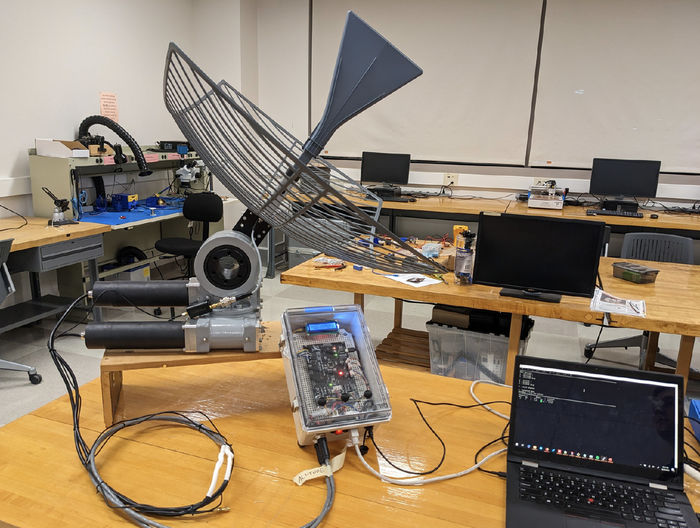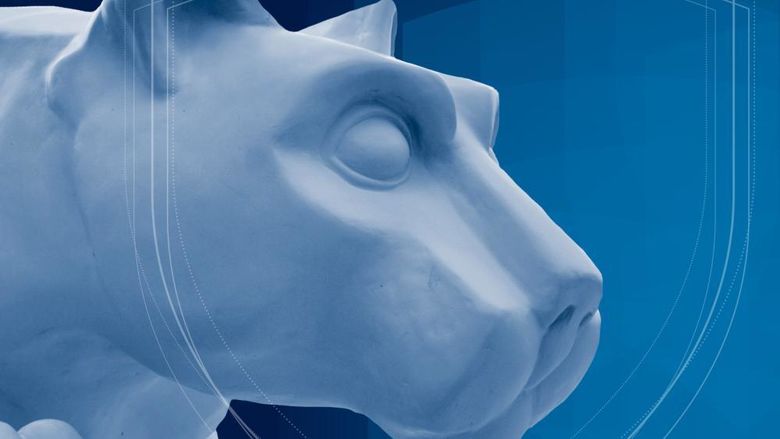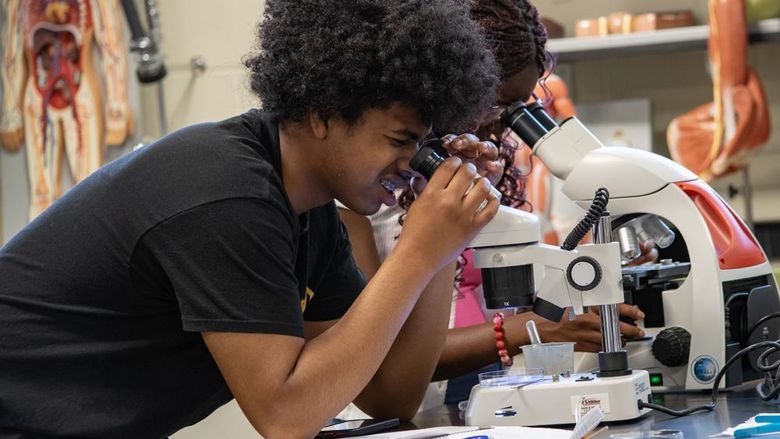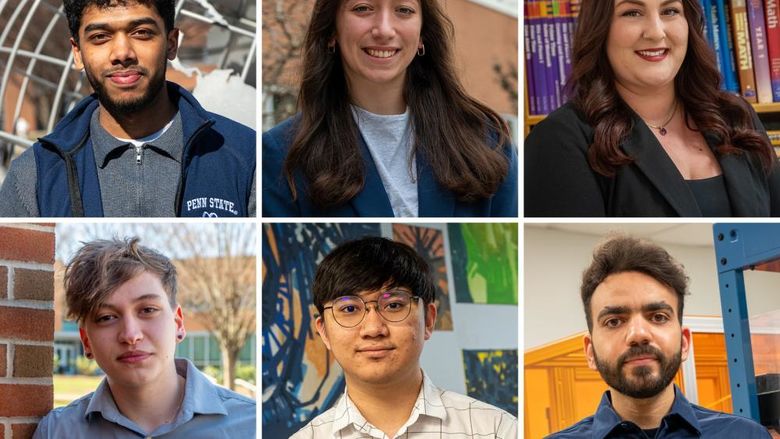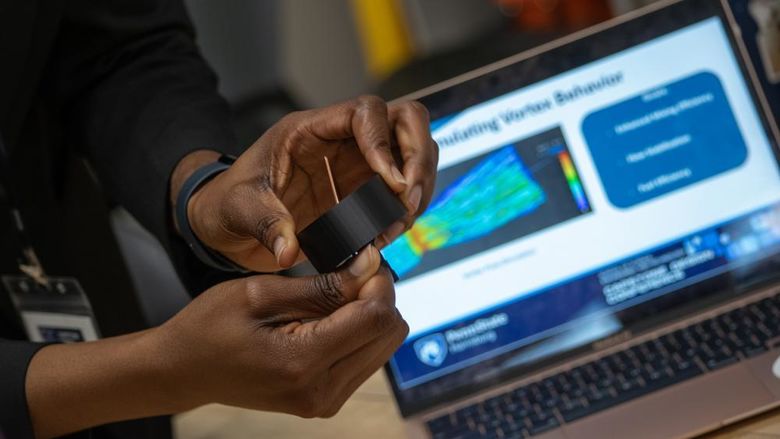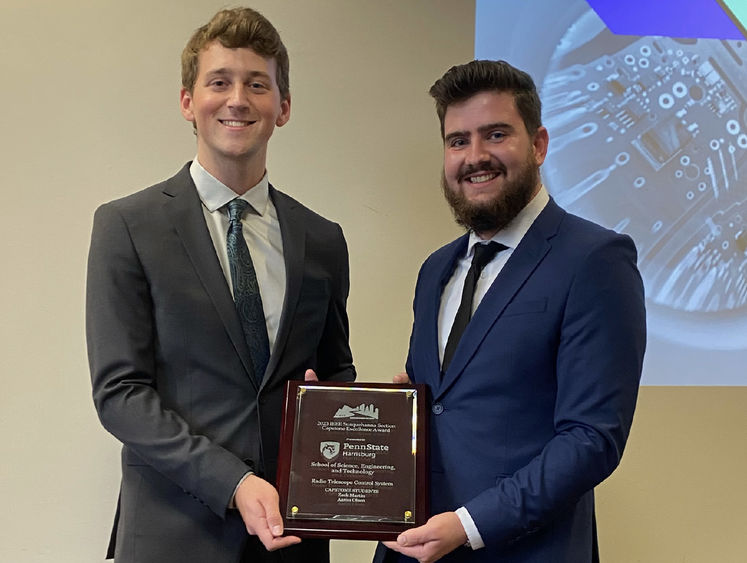
Aaron Olsen and Zachary Martin hold the 2023 Capstone Award they received from the Institute of Electrical and Electronic Engineers Susquehanna Section. The pair received the award for their work on a radio telescope control system.
MIDDLETOWN, Pa. — A pair of Penn State Harrisburg students were recognized with the Institute of Electrical and Electronic Engineers (IEEE) Susquehanna Section’s Capstone Award for 2023 for their project — a radio telescope control system that could help future students explore the stars.
Zachary Martin and Aaron Olsen — who each earned bachelor’s degrees in electrical engineering in May and are now Penn State Harrisburg graduate students — teamed up for their capstone project in spring 2023. They later submitted it for the 2023 IEEE Susquehanna Section competition and were one of two winning teams selected, alongside students from York College.
For their capstone project, which engineering students complete as seniors to apply the skills they’ve learned in the classroom, Martin and Olsen designed a radio telescope control system. A small-scale radio telescope could provide a way for students to learn the basics of radio astronomy and astrophysics by measuring radio frequency signals emitting from celestial objects.
“With a regular optical telescope, you’re looking at stars, you’re looking at light energy," Martin said. "You can see a bright star, a bright spot. A radio telescope looks at the radio spectrum because stars and other things are also emitting radio energy at the same time as they are emitting light energy.”
Martin and Olsen worked to design a control system that could control a dish antenna and precisely point and move the dish to map the position and intensity of stars.
“The project just seemed interesting, to scan something you can’t see with your naked eye or an optical telescope,” Olsen said. “The concept of exploring space with this would be pretty interesting to contribute to.”
Radio telescopes are typically huge, Martin said. Their system will control a 10-foot dish, compared to radio telescopes that might have dishes that are hundreds of feet across.
“The idea of this is we’re scaling it down to something that the IEEE [campus chapter] and Penn State Harrisburg Astronomy Club can use, and we can kind of hand off to them as a student project,” Martin said.
They consulted the clubs while they worked on the project to try to ensure they were making a system that could be used by the students in the future.
Kiana Karami, assistant professor of electrical engineering and technical adviser for the project, said she was impressed by the students’ passion and intelligence.
“They are not only self-motivated and creative, but their innovative ideas and dedication to their work consistently pushed the project to new heights,” she said. “Their project served as a crucial component of a larger initiative, and with their remarkable success, it holds the potential to make a profound and lasting impact on students involved in various clubs. They unquestionably deserve the awards they receive, as their relentless commitment and exceptional contributions have not only elevated the project but have also positively influenced the educational experiences of other students.”
Olsen is now pursuing a master’s degree in electrical engineering through the integrated undergraduate/graduate program at Penn State Harrisburg. Martin is also pursuing his graduate degree part-time at Penn State Harrisburg and working full-time as an electronic engineer at RLC Electronic Systems.
Though their capstone project is done, the radio telescope work will continue to evolve. There’s additional work for clubs to do on the system, as well as finding a permanent home for the 10-foot dish to be installed.
“I think it turned out really well — it’s obviously not full scale, but it’s exactly what we were looking for,” Olsen said. “We learned a lot throughout the project, too.”
Olsen noted that they pushed the project a little further than they originally planned.
“It really is a legitimate run at building a small-scale radio telescope," Martin said. "It’s a matter of building on what we started with.”
